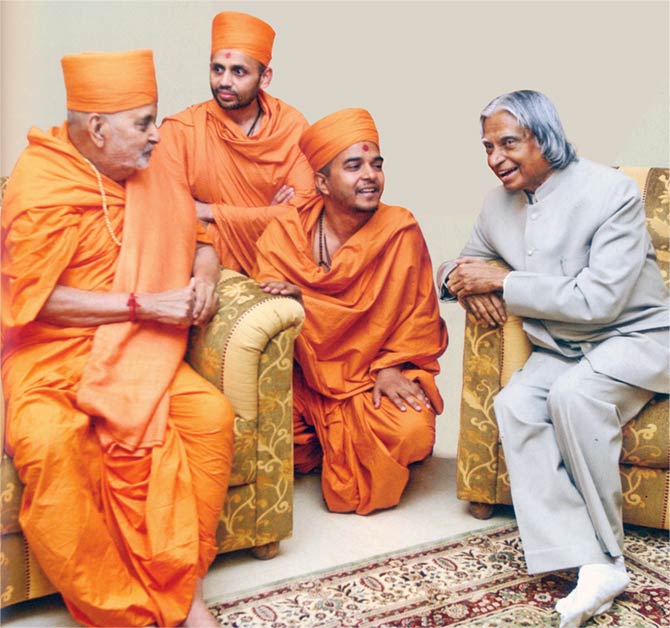V
V.Balasubramani
Guest
A P J Abdul Kalam: All human beings carry divinity inside themselves
'This can lift us out of confusion, misery, melancholy and failure, and indeed guide us when it is contacted.'
'For us to ignite our spirituality, we need to look inward and transcend our egos. We need to recognize, connect with and integrate the eternal spirit within,' says A P J Abdul Kalam in his latest book, Transcendence.

I have vivid memories of my childhood in Rameswaram, but one memory particularly stands out, and comes to mind occasionally. As a ten-year-old boy, I recall seeing three contrasting personalities meet from time to time in our home: Pakshi Lakshmana Shastrigal, the Vedic scholar and head priest of the famous Rameswaram temple; Rev Father Bodal, who built the first church on Rameswaram Island; and my father, who was an imam in the mosque. These three would sit in our courtyard, each with a cup of tea; and they would discuss and find solutions to the various problems facing our community.
Reflecting on this, I can see that my father and his religious counterparts in Rameswaram were expressing a long-standing cultural trait. India has shown a healthy propensity for integrating diverse ideas and reaching a consensus, for thousands of years. And I cannot help but feel that the example of those inter-religious meetings at my family home is most worthy of emulation. Because now, throughout the nation and the world, the need for such frank and genial dialogue among cultures, religions and civilizations is more urgent than ever.
Starting with my father, Jainulabdeen, I have been blessed with some great teachers, who appeared at different stages of my life. My father taught me to view one's role in life as that of an instrument or vessel, through which one takes with one hand and gives with the other. "There is only one light, and you and I are holes in the lampshade," he would say.
Read more at: http://www.rediff.com/news/special/...m-a-p-j-abdul-kalams-latest-book/20150730.htm
'This can lift us out of confusion, misery, melancholy and failure, and indeed guide us when it is contacted.'
'For us to ignite our spirituality, we need to look inward and transcend our egos. We need to recognize, connect with and integrate the eternal spirit within,' says A P J Abdul Kalam in his latest book, Transcendence.

I have vivid memories of my childhood in Rameswaram, but one memory particularly stands out, and comes to mind occasionally. As a ten-year-old boy, I recall seeing three contrasting personalities meet from time to time in our home: Pakshi Lakshmana Shastrigal, the Vedic scholar and head priest of the famous Rameswaram temple; Rev Father Bodal, who built the first church on Rameswaram Island; and my father, who was an imam in the mosque. These three would sit in our courtyard, each with a cup of tea; and they would discuss and find solutions to the various problems facing our community.
Reflecting on this, I can see that my father and his religious counterparts in Rameswaram were expressing a long-standing cultural trait. India has shown a healthy propensity for integrating diverse ideas and reaching a consensus, for thousands of years. And I cannot help but feel that the example of those inter-religious meetings at my family home is most worthy of emulation. Because now, throughout the nation and the world, the need for such frank and genial dialogue among cultures, religions and civilizations is more urgent than ever.
Starting with my father, Jainulabdeen, I have been blessed with some great teachers, who appeared at different stages of my life. My father taught me to view one's role in life as that of an instrument or vessel, through which one takes with one hand and gives with the other. "There is only one light, and you and I are holes in the lampshade," he would say.
Read more at: http://www.rediff.com/news/special/...m-a-p-j-abdul-kalams-latest-book/20150730.htm
